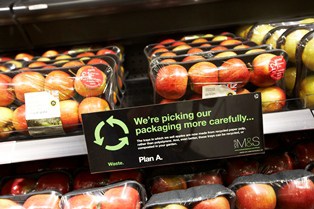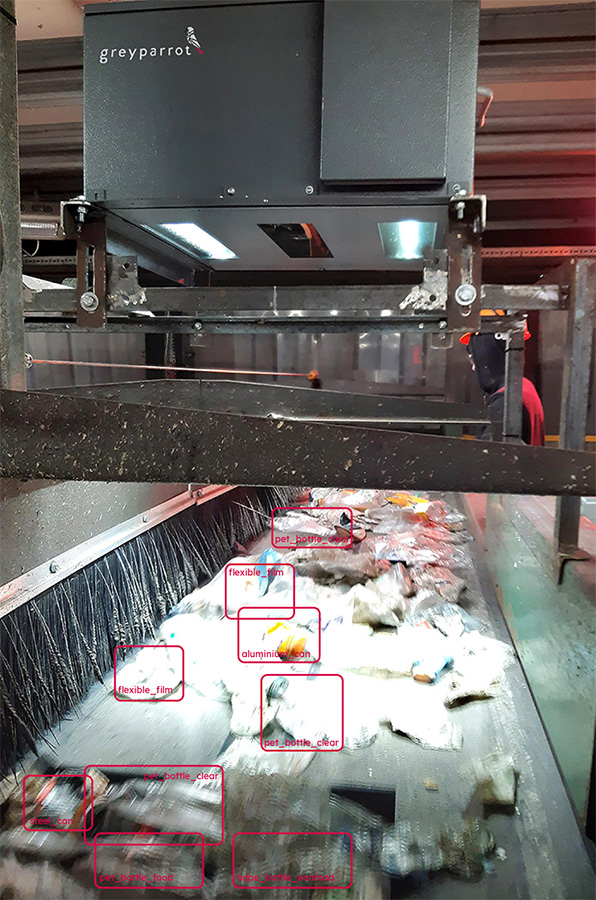And, the company has warned of a “potentially significant threat” to the use of recycled materials across Europe should nanotechnology be developed within the printing process.

The warnings come as the retailer announced that under its Plan A environmental programme it had achieved many of its aims ahead of target, including 91% of its packaging being recyclable.
Launched in 2007 with 100 commitments and extended in March 2010 by a further 80, M&S said it has already achieved the majority of its objectives including becoming the first major retailer to become carbon neutral and achieving its goal of sending zero waste to landfill.
The potential limits to the use of recycled content in paper packaging because of food safety concerns were explained by Andrew Speck, M&S commercial and environmental packaging manager, who was speaking at the Paper Recycling Europe conference earlier this month.
Mr Speck saidthat the retailer sold 95% of its products under its own-brand label giving it an advantage in controlling the packaging materials used.
He said that Marks and Spencer aims to use virgin FSC-certified paper and board although it is migrating to the Sustainable Forestry Programme for virgin products and uses recycled where there are no performance or safety issues.
Mineral oils
Mr Speck continued: Mineral oils are a big issue to us and this is a grey area. Certainly this is a challenge to sort out. He referred to news reports which claimed that researchers had found toxic chemicals from recycled paper and board had contaminated food sold in many cardboard cartons beforehighlighting particular concerns about the development of nanotechnologies in the printing world, referring to work by Landa.
‘We have a policy at M and S of not using engineered particles in our supply chain.’
Andrew Speck, commercial and environmental packaging manager, Marks & Spencer
Earlier this year the Landa Corporation in a press statement announced the details of its groundbreaking Landa Nanographic Printing Presses that are set to transform mainstream commercial, packaging and publishing markets. With output speeds comparable to offset presses and employing NanoInk colorants that create unprecedented image qualities, the Landa Nanographic Printing Press portfolio is set to fundamentally change printing as we know it.
Threat
The M&S manager explained that his company was watching the development of such technology closely. Landa have launched digital printing using nanography and nano inks. We have a policy at M&S of not using engineered particles in our supply chain. This could potentially be a very big threat to the use of recycled materials in Europe, particularly cartonboard coming into contact with foods.
And, Mr Speck broadened his concerns into the newsprint sector. If these nanos are being recycled into free newspapers how do I know they are not being transferred through my skin into my body?
Also on the subject of newspapers, Mr Speck hit out at what he saw as a failure to recycle thousands of copies of the free Metro newspapers, particularly in London. There is a real opportunity for more on the go recycling and the Metro newspaper is a good example. I see the newspapers all over the tube and coming here today.
He asked: How can we make sure we get hold of these materials? The Metro newspaper can consume more paper each year than the total M&S food group packaging usage.
Looking at broader issues, Mr Speck reflected M&S thinking on global matters. He pointed to the UK chief scientists global report on the perfect storm with growing populations, falling energy sources and food shortages. Our challenge is what are we going to be doing about this perfect storm?
Related links
How we find enough raw materials and the scarcity of water may also impact on papermaking. The challenge for the future is feeding more people from the same amount of land using half the amount of energy. Acting now gives us the chance to manage these aspects.










Subscribe for free